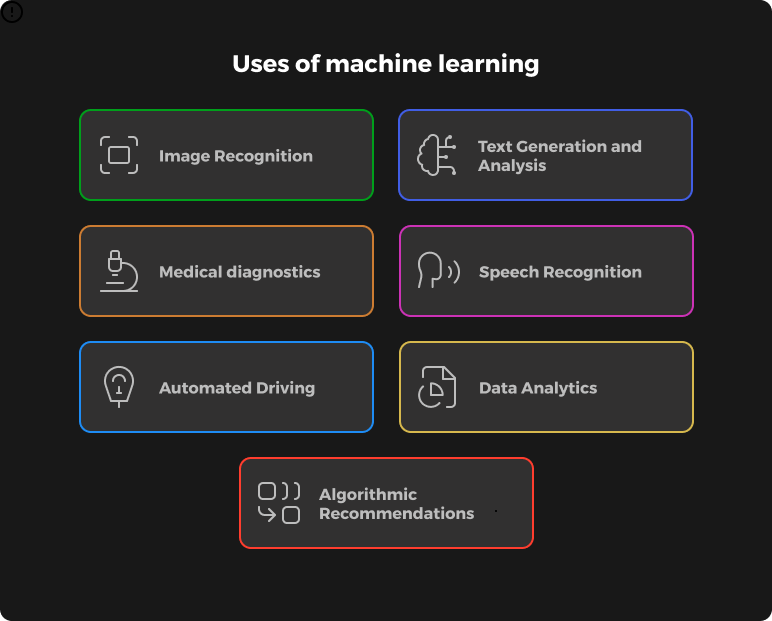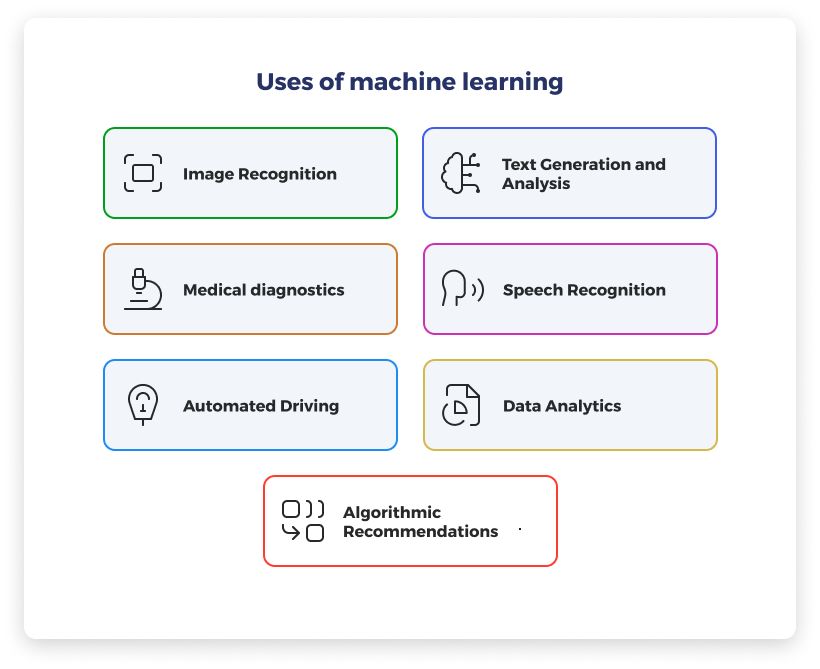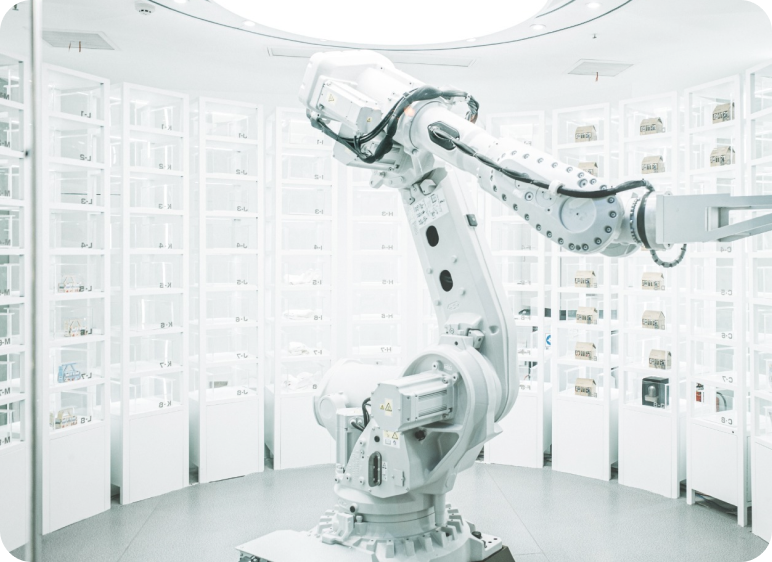Machine Learning (ML)

Machine Learning
Unlock the power of Machine Learning, where algorithms learn from data to make predictions, automate tasks, and drive intelligent decision-making
Exploring Machine Learning Applications: Top 12 Use Cases in 2023
The pervasive integration of machine learning (ML) across various industries has not only ushered in technological breakthroughs but also led to groundbreaking innovations. From predictive engines and personalised recommendations to disease detection and autonomous driving, ML has left an indelible mark on the world of technology. In fact, it is projected that the ML market, which currently stands at approximately $140 billion, will soar to nearly $2 trillion by 2030.
This article leverages the expertise of Zeus, a prominent software development company with a specialised focus on machine learning consulting. Here, we delve into the multifaceted landscape of ML applications in diverse sectors. You will gain insights into the hows and whys of machine learning, its compelling advantages, and its remarkable real-world applications. We will also take a closer look at Zeus’s success stories, including Supply Chain Predictive Analytics and Retail Category Management, to illustrate tangible examples of the seamless integration of machine learning into business operations.
Understanding the Mechanics of Machine Learning
Machine learning, a subset of artificial intelligence, empowers computers to glean knowledge from experience without explicit human programming. Using intricate algorithms, machines can analyze data, discern underlying patterns, and make predictions or decisions based on the insights they extract. The performance and accuracy of these algorithms improve as they are exposed to more data.
Machine learning primarily encompasses three key areas:
Supervised learning
In this realm, algorithms learn from labeled data to forecast or classify new, unseen instances with precision.
Unsupervised learning
Algorithms navigate through unlabeled data to unveil hidden patterns and relationships, assisting in clustering and data exploration.
Reinforcement learning
Agents engage with their environments, mastering optimal actions through trial and error to attain specific objectives.
Machine learning (ML) algorithms operate under the premise of needing input data paired with corresponding output labels, representing the desired outcome or prediction. This interplay between data and labels is predominantly witnessed in supervised learning, forming the crux of ML model training. The meticulous process of data preparation within machine learning serves as a linchpin in enhancing ML models and catalysing breakthroughs across a multitude of industries, spanning healthcare, finance, marketing, and entertainment.
Unpacking the Advantages of Machine Learning
Zeus has established a well-defined and efficient process for DevOps and Cloud services, ensuring that your cloud transformation is smooth and successful. Our process encompasses several key steps:


Automation:
ML is the harbinger of process automation, substantially diminishing the reliance on manual intervention and significantly expediting task execution.


Continual Improvement
Machine learning algorithms exhibit a unique capability to perpetually learn and adapt, gradually constructing their own knowledge base and expanding their functional repertoire.


Reduced Human Intervention
By harnessing ML algorithms to automate routine, repetitive tasks, businesses not only optimize resource allocation but also curtail the margin of human error.


Efficient Data Processing
ML unfurls its prowess in analyzing a diverse spectrum of data types, offering invaluable insights culled from structured and unstructured datasets.


Versatile Applicability
The transformative influence of machine learning reverberates across virtually every sector and industry, from healthcare and finance to retail, catalyzing revolutionary shifts in operational paradigms.
Applications of Machine Learning Across Industries
Machine learning has woven its way into a myriad of sectors, optimizing processes and augmenting decision-making. Here’s a snapshot of common applications that illustrate its versatility:


1. Image Recognition
Machine learning, through computer vision, excels at identifying and classifying objects and patterns within images. It empowers technologies like facial recognition, image-based search, and object detection in design diagrams..
2. Medical Diagnostics
ML plays a pivotal role in medicine by analyzing images and predicting patient outcomes. It aids in diagnosing diseases and genetic disorders, contributing to enhanced medical diagnostics
3. Automated Driving
The realm of self-driving cars relies on machine learning to process sensor data swiftly and make real-time decisions, ensuring safe and reliable navigation.
4. Text Generation and Analysis
Natural Language Processing (NLP) empowers machines to comprehend, generate, and scrutinize human language. This proficiency facilitates content creation and text correction, among other applications.
5. Speech Recognition
Machine learning unleashes the power of precise speech recognition, enabling interpretation and automation of speech-to-text conversions.
6. Data Analytics
ML algorithms are instrumental in businesses’ pursuit of deciphering large datasets, extracting invaluable insights, and steering data- driven decision-making.
7. Algorithmic Recommendations
E-commerce platforms and entertainment services leverage machine learning to tailor recommendations based on user preferences, enhancing user experiences.
The utilization of machine learning is as diverse as it is transformative, consistently reshaping the landscapes of these industries.
The Appropriate Use of Machine Learning
Machine learning becomes indispensable when conventional methods prove inadequate in handling extensive volumes of statistical data. Machine learning algorithms excel in identifying intricate patterns and relationships within vast datasets, offering invaluable insights that simple rules or calculations may struggle to discern, especially when predicting a target value efficiently.
So, where is machine learning optimally employed? It frequently finds its stride in scenarios that involve forecasting outcomes or uncovering trends. Machine learning thrives when dealing with structured or categorized data, making it a robust tool for the organization and analysis of multimedia content such as videos, photos, and audio files. ML algorithms demonstrate exceptional prowess in swiftly classifying and evaluating this data, as exemplified by their ability to identify faces within images.
A Glimpse of Successful Machine Learning Applications
Machine learning isn’t confined to tech-centric domains; its influence spans across a plethora of industries. Below, we delve into some of the prominent applications of ML in diverse sectors:
Machine Learning in E-Commerce
Within the realm of e-commerce, machine learning comes to the fore by empowering businesses to anticipate customer behaviour, optimise pricing strategies, and elevate the overall shopping experience. ML algorithms pave the way for e-commerce enterprises to deliver personalised product recommendations, targeted marketing campaigns, and efficient inventory management.
ML-driven recommendation engines, fraud detection systems, and customer support chatbots collectively enhance the e-commerce landscape for both buyers and sellers. These technologies enable e-commerce giants like Amazon and Alibaba to sustain growth, enticing users with seamless, personalised shopping experiences. Smaller e- commerce players can also harness Amazon’s ML-approved recommendation engines and customer segmentation tools, accessible through AWS, to enhance their operational efficiency. For instance, you can explore our recent project involving an ML-powered anti-fraud system for e-commerce users.
Machine Learning in Healthcare
Machine learning is revolutionising healthcare, offering precise diagnostics, optimising treatment plans, and predicting outbreaks. It leverages patient data to predict disease risks, aids in the discovery of novel drugs, and automates medical image analysis. The technology underpins telemedicine,
helping doctors remotely monitor patients, making quality healthcare accessible, and even supporting the development of personalised treatments.
Machine Learning in Finance
In the financial sector, machine learning enhances risk assessment, fraud detection, and algorithmic trading. ML algorithms swiftly analyze vast datasets to identify fraudulent activities, enabling financial institutions to safeguard against monetary losses. Furthermore, these algorithms enable the automation of trading strategies, responding to market fluctuations with rapid precision.
Machine Learning in Agriculture
Agriculture benefits from machine learning through the optimization of crop yield predictions, disease detection, and pest control. By evaluating data from various sources like weather conditions and soil quality, ML algorithms assist farmers in making informed decisions regarding planting, harvesting, and resource allocation.
Machine Learning in Transportation
Machine learning isn’t confined to tech-centric domains; its influence spans across a plethora of industries. Below, we delve into some of the prominent applications of ML in diverse sectors:
Machine Learning in Energy
Machine learning bolsters the energy sector by enabling predictive maintenance for equipment, optimising energy consumption, and enhancing grid stability. ML algorithms forecast potential breakdowns in critical machinery, enabling preemptive maintenance and reducing downtime.
Machine Learning in Manufacturing
Manufacturers employ machine learning to refine quality control, optimise production processes, and predict machine failures. ML-driven analytics help manufacturers minimise defects, streamline operations, and enhance overall efficiency.
Machine Learning in Marketing
Marketing harnesses machine learning for personalized campaigns, customer segmentation, and dynamic pricing strategies. ML algorithms analyze consumer behavior and preferences to deliver tailored marketing content, resulting in higher conversion rates and customer satisfaction.
Machine Learning in Entertainment
In the entertainment industry, machine learning enhances content recommendations, assists in content creation, and personalizes user experiences. Streaming platforms use ML to suggest movies or music, while studios employ AI-generated scripts and special effects to create captivating content.
Machine Learning in Environmental Conservation
Machine learning supports environmental conservation by monitoring deforestation, wildlife preservation, and climate modelling. It analyses satellite imagery to track changes in forest cover, identifies and protects endangered species, and forecasts climate patterns to aid in proactive conservation efforts.
Machine Learning in Education
Education leverages machine learning to provide personalized learning experiences, assess student performance, and identify areas for improvement. By analyzing students’ progress, ML algorithms enable educators to offer tailored support and enhance learning outcomes.
Machine Learning in Customer Service
Machine learning enhances customer service through chatbots, sentiment analysis, and issue resolution automation. AI-powered chatbots provide instant, round-the-clock support, while sentiment analysis tools gauge customer feedback and guide businesses in improving service quality.
These examples underscore the versatile applications of machine learning across various sectors, underscoring its capacity to drive innovation, efficiency, and excellence.
Machine Learning in Enhancing Fraud Detection Strategies
The implementation of machine learning is instrumental in fortifying fraud detection strategies, bolstering identity verification, and uncovering suspicious patterns. Machine learning algorithms, tailored for fraud detection, delve into extensive historical and real-time datasets. These algorithms leverage a multitude of factors to unearth implicit and explicit correlations between user behaviour and the potential for fraudulent activities.
With machine learning at the helm, organisations can swiftly pinpoint dubious transactions, conduct comprehensive anti-fraud analyses without compromising the user experience, and minimise financial losses. The diverse applications of machine learning in fraud detection encompass areas such as credit card fraud prevention, Point-of-Sale (POS) anomaly detection, account takeover prevention, behavioural biometrics, and safeguarding against invoice fraud.
Machine Learning’s Impact on the Retail Landscape
Machine learning applications have revolutionised the retail sector by enabling retailers to decipher vast volumes of customer data that would be overwhelming for manual analysis. ML-powered innovations in personalised recommendations, dynamic pricing, customer feedback analysis, chatbot assistance, category management, and inventory forecasting have ushered in a new era for retailers.
The infusion of machine learning into retail operations elevates the overall customer experience, optimises supply chain management, drives increased sales, and mitigates churn rates. Retailers leveraging machine learning not only retain their existing customer base but also attract new patrons. In doing so, they save valuable time and resources, thwart fraudulent activities, and cultivate a reputation as forward-thinking establishments dedicated to the happiness of their clients.
Harnessing Machine Learning for Retail Demand Prediction
Accurate demand forecasting is pivotal for retail success, offering a means to optimise inventory levels and reduce operational costs. Machine learning provides retailers with the capabilities to analyse a plethora of variables and intricate relationships influencing daily demand. Machine learning models meticulously scrutinise historical sales data and incorporate external factors to foresee future demand, preventing stock overstocking and understocking.
Machine learning algorithms, continually evolving and adapting, dissect large-scale datasets sourced from diverse origins. They anticipate the requirement for specific products at each location, on any given day, by recognising recurrent patterns, internal corporate strategies, and external dynamics such as weather conditions, regional events, and competitor actions. This meticulous approach ensures precise, granular, and automated demand projections, facilitating robust product availability and minimising inventory risk.
Machine Learning for Anomaly Detection
Machine learning’s prowess in anomaly detection transcends multiple domains, including cybersecurity and manufacturing. Machine learning solutions are adept at processing massive volumes of data with remarkable speed, enabling the real-time identification of anomalies and empowering swift responses to avert potential threats.
Certain machine learning models progressively enhance their accuracy in detecting outliers as they encounter new instances, staying vigilant against evolving fraudulent schemes. Unsupervised machine learning models exhibit the ability to learn from data that hasn’t been explicitly categorised as “normal” or “anomalous,” enabling them to uncover irregularities that might elude human observation.
Machine Learning Revolutionizing Supply Chain Management
The integration of machine learning into supply chain management revolutionises the field by ushering in a new era of enhanced predictability, streamlined logistics, and remarkable reductions in lead times. This transformation results in superior efficiency and cost-effectiveness for businesses involved in supply chain operations. Machine learning technologies also bestow real-time tracking and monitoring capabilities upon shipments, empowering proactive issue resolution and elevating customer satisfaction levels.
Machine learning brings a level of precision and responsiveness that reverberates throughout the supply chain. By automating repetitive processes, pinpointing inefficiencies, and seamlessly adapting to ever-changing market dynamics, this technology offers significant cost savings.
Machine Learning’s Role in the Insurance Sector
Machine learning emerges as a pivotal player in the insurance industry, supporting risk assessment and expediting claim processing. Through the creation of machine learning-based models, insurers gain the ability to scrutinise customer data, assess policy risks, and unearth potential instances of fraud. These advancements contribute to a substantial enhancement in the overall operational efficiency of insurance companies. The versatile applications of machine learning in the insurance sector encompass personalisation, insurance risk estimation, automatic document recognition, evaluation of damaged assets, and the computation of potential repair costs.
Machine Learning’s Influence on Finance
Machine learning exerts a transformative influence on the financial services sector, enhancing risk assessment, fraud detection, and customer service. Within the financial domain, analysts harness the power of machine learning to automate trading procedures, detect fraudulent activities, analyse market trends, predict stock prices, and make data-driven investment choices.
Banking institutions deploy ML algorithms to ascertain the suspicious nature of transactions relative to other data points. For instance, they can discern whether a $500 Amazon purchase aligns with a specific client’s typical behaviour. Additionally, financial rob-advisors driven by machine learning algorithms offer invaluable support in portfolio management by tailoring investment strategies to align with investors’ goals, risk tolerances, and other individualised characteristics.
Machine Learning’s Inroads into Healthcare
Machine learning’s foothold in the healthcare domain is evident in its capacity to customise medical treatments, expedite administrative procedures, augment patient care, and elevate disease diagnosis standards. From the meticulous analysis of medical images to the formulation of personalised treatment regimens, machine learning leaves an indelible mark on healthcare innovation.
Noteworthy applications include cutting-edge technologies such as PathAI, which employs machine learning to connect patients with the latest therapies and treatments. This convergence of machine learning and healthcare promises to enhance the quality of patient care, streamline clinical workflows, and further our understanding of diseases and their treatments.
Machine Learning’s Role in Healthcare – A Deeper Dive
Machine learning’s applications in healthcare transcend simple disease detection. In an age where electronic health records have become ubiquitous, ML algorithms have ushered in a new era of predictive healthcare. For instance, these algorithms can predict the onset of heart failure by delving into doctors’ electronic notes and identifying commonalities in a patient’s cardiovascular history. Moreover, machine learning serves as a valuable tool in forecasting emergency room wait times, an essential aspect of hospital department management.
Machine Learning Transforming Education
The educational landscape is undergoing a seismic transformation, thanks to machine learning. Its influence is most prominently felt in two spheres: streamlining administrative tasks and enhancing student-focused initiatives. The integration of machine learning technologies facilitates adaptive and inclusive learning environments, personalised tutoring, performance assessment, real-time translation services, task automation, and the implementation of chatbots for student support.
Furthermore, commercial educational institutions and eLearning platforms leverage machine learning to target potential students with meticulously tailored advertisements, thereby encouraging subscriptions and boosting enrolment numbers.
Machine Learning’s Defensive Role in Cybersecurity
The realm of cybersecurity is constantly under siege from evolving threats. Machine learning emerges as a stalwart defender, capable of detecting previously unrecognised threats and anomalies. Its ability to discern malware, malicious activities, and phishing attempts adds a layer of protection that would have otherwise remained hidden. Moreover, machine learning models can dissect typical user behaviours, rapidly identifying deviations that require further investigation.
The applications of machine learning in cybersecurity span a wide spectrum, encompassing vulnerability management, static and behavioural analysis, anomaly detection, forensic analysis, and sandbox malware examination. These versatile tools enhance the security of digital systems, ensuring a safer digital environment for individuals, businesses, and institutions alike.
Machine Learning Applications by Leading Companies
Businesses of all sizes have harnessed the power of machine learning to enhance their product portfolios and streamline their operations. Here are some notable machine learning examples in the business world:
Meta
In 2020, Meta introduced an innovative Facebook chatbot called Blender, setting itself apart by enabling conversational versatility that extended beyond a predefined list of topics. This remarkable bot underwent extensive training, with its initial knowledge base drawn from a staggering 1.5 billion publicly available Reddit conversations. Further refinements focused on enhancing its proficiency in emotional dialogues, handling substantial data sets, and facilitating seamless interactions among users with diverse personalities.
Amazon
Amazon, a trailblazer in the e-commerce industry, has embraced machine learning to revolutionize product recommendations. As you navigate and shop on Amazon’s platform, you’ll encounter suggestions such as “Customers Who Bought This Product Also Bought.” These recommendations are generated by machine learning algorithms, which effectively classify both products and users to offer tailored suggestions that enhance the shopping experience.
Zeus Health Agent (HAG)
Zeus has taken machine learning to the realm of healthcare with Health Agent (HAG). This groundbreaking technology combines the recognition and analysis of X-ray and MRI data with a knowledge base vectorized using transformer-based LLM models. The result? Insights and findings essential for formulating hypotheses, critical for physicians when tackling complex medical cases. HAG’s cutting-edge capabilities underscore Zeus’s commitment to advancing the frontiers of healthcare with the power of machine learning.
Zeus: Pioneering Machine Learning Solutions for Your Business
At Zeus, we specialize in tailoring machine learning (ML) solutions to precisely align with your unique business requirements, ensuring unparalleled results. Our accomplished team of professionals has successfully delivered a multitude of ML projects, including predictive analytics and anomaly detection. Our machine learning consulting service is designed to illuminate how ML technologies can empower your organization, from identifying the potential benefits to creating a comprehensive roadmap for the development and deployment of ML solutions.
Zeus: Redefining Business Through Machine Learning
Irrespective of your business’s size, Zeus is dedicated to mitigating the inherent risks associated with the development of ML solutions, including data integrity, confidentiality, the demanding implementation process, and intricate engineering prerequisites. During the consultation phase, we meticulously analyze your specific situation, identifying potential obstacles, and recommending the most suitable course of action.
Real-World Success Stories
Supply Chain Predictive Analytics Our client, a renowned supply chain software and service provider, enlisted Zeus to optimize Supply Chain Predictive Analytics by harnessing ML-powered automation for exception prediction and data processing from diverse suppliers. This revamping of the machine learning model for logistics and supplier-related incident prediction yielded impressive outcomes, including:
- A remarkable 80% improvement in forecasting accuracy.
- The development of a cutting-edge, user-friendly interface from the ground up.
- Streamlined report generation in a variety of formats and frequencies.
AI-Driven Solution for Credit Risk Assessment In the dynamic landscape of financial services, Zeus’s AI-driven Solution for Credit Risk Assessment stands as a beacon of innovation. This pioneering solution, empowered by advanced ML algorithms and predictive analytics, equips financial institutions with the ability to make astute lending decisions, marked by unprecedented precision. Through real-time data analysis and pattern recognition, our solution minimizes risk exposure while maximizing the efficiency of credit evaluation processes. The impact is tangible:
- A remarkable reduction in default rates.
- Drastically reduced loan approval times, enhancing customer satisfaction and accelerating business growth.
Mobile Hyper-Personalization on Edge Devices Embrace the future with Zeus’s Mobile Hyper-Personalization solution on edge devices. In an era where user expectations for personalized experiences are at an all-time high, our forward- thinking approach deploys real-time data processing and machine learning to deliver tailor-made content and recommendations directly to users’ mobile devices. The impact is profound:
- Achieve a 6X increase in click-through rates (CTR) through real- time user engagement.
- Experience a 3X boost in conversion rates (CVR) by elevating real-world personalization and segmentation.
- Double your CTR by optimizing push message deliverability.
- Witness a substantial 30% increase in user retention through early identification and targeting of at-risk users.
- Significantly reduce churn by offering uniform personalization to all users.
Unleash the Potential of Machine Learning with Zeus
Machine learning has evolved into an indispensable asset across diverse industries, fuelling process automation, efficient data management, data-driven decision- making, and heightened customer satisfaction. Our exploration of the top 12 machine learning applications in business, supported by concrete real-life cases and examples, underscores the transformative capabilities of this technology.
Zeus stands ready to guide you in harnessing the power of machine learning for your business. Our team excels at developing customised ML solutions that cater to your company’s distinct needs, yielding groundbreaking results. With our machine
learning consulting service, you’ll gain comprehensive insights into the technology’s business advantages and receive a strategic roadmap for the seamless development and implementation of ML solutions.
Frequently Asked Questions (FAQs)
Why is machine learning so significant?
Machine learning holds immense importance for businesses by enabling task automation, process optimisation, and the extraction of invaluable insights from extensive datasets, all without the need for explicit programming.
What’s involved in creating a machine learning model?
Building a machine learning model encompasses multiple crucial steps, including data collection, preprocessing, feature engineering, model selection, training, and comprehensive evaluation.
What is the purpose of utilizing machine learning?
Machine learning serves as a transformative tool for obtaining invaluable insights from vast datasets, a feat that was once inconceivable through traditional rule-based methodologies.
Can you elaborate on machine learning algorithms?
Machine learning algorithms are intricate mathematical models designed to scrutinize data, unearth intricate patterns, and subsequently make predictions or informed decisions that have extensive real-life applications.
In which industries is machine learning most prevalently adopted?
The influence of AI and machine learning transcends diverse sectors, including but not limited to medicine, finance, fintech, retail, cybersecurity, and education, paving the way for groundbreaking advancements and optimisations.













